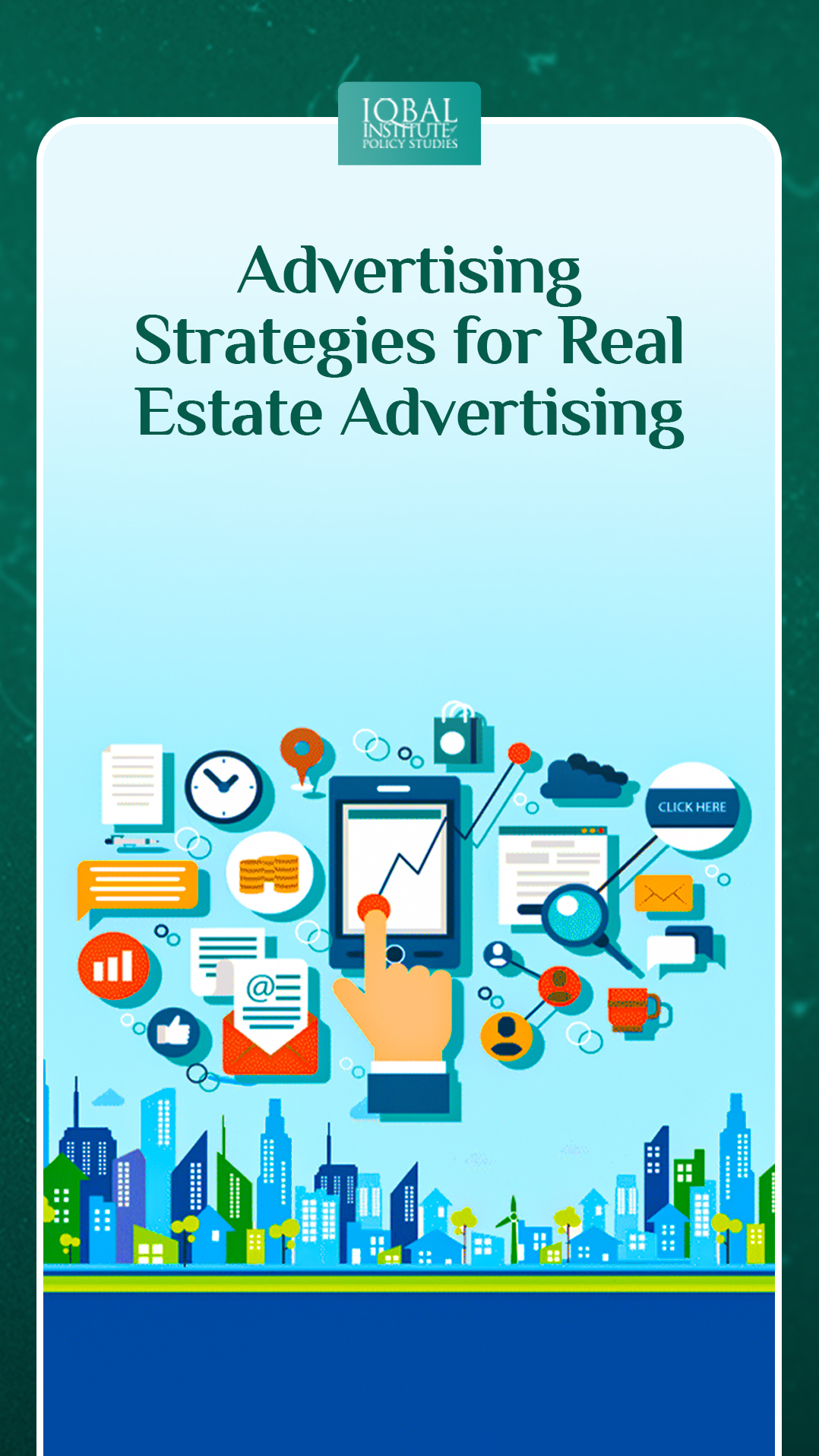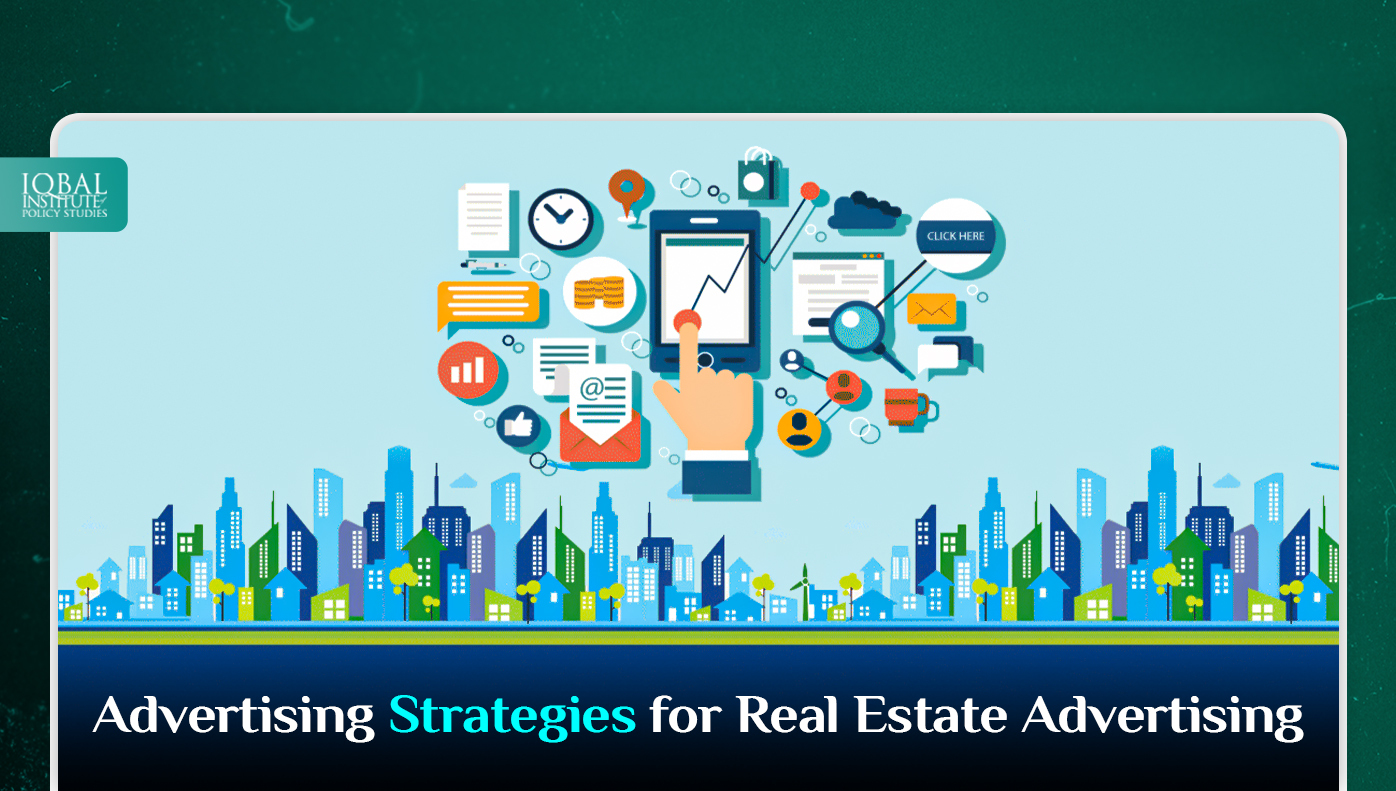The real estate industry is expanding rapidly, and so is competition. In order to stand out in the crowded real estate market, businesses are implementing cutting-edge and distinctive advertising strategies. Advertising is vital for enhancing the benefits of exposure of a real estate company as it is a crucial medium of communicating with the customers and informing them about what the company is and what it does. It also creates brand awareness, provides a basis for promoting real estate products and services, allows one to reach a wider audience, and generates seller and buyer leads. However, real estate advertising strategies may be exceptionally analytical and intricate to pursue. There is no one size fits all strategy for real estate marketing. Some properties might be best served by straightforward web advertising, while others might draw correct customers via print advertisements. Therefore, targeting the right audience and using intelligent advertising strategies is imperative to attract a larger pool of clients, expand the business and increase the company’s revenue.
Effective Advertising Strategies for a Real Estate Company
Identify the Audience
The target audience involves the group of people a company wants to attract. One quick strategy to do that is targeting them based on their location. For example, if the target audience lives in Islamabad, the company should not advertise for prospective clients residing in Lahore. Moreover, determining the type of audience can further assist in effectively attracting potential customers. For instance, whether the company wants to target first-time homebuyers or clients interested in luxury real estate. Also, identifying the right platform suitable for advertising is crucial, which can be determined by conducting polls on social media or through emails, texts or surveys. Working with buyers and sellers is appropriate for a real estate company. Therefore, it is best to be as exact as possible while running advertisements. Instead of attempting to target many demographics with one ad, the company will have more success by running different ads for buyers and sellers.
Recognize the Objectives of the Advertising Campaign
Determining advertising goals and objectives aid the real estate company in achieving financial goals and interlinking with prospective clients. Hence, advertising campaigns are designed and produced to expand the business and grow the company’s income and sales. However, real estate companies should be specific with their objectives and goals before investing in such campaigns, highlighting whether the ads are for lead generation, brand awareness, or increasing sales. The possibilities are endless. The goals should be carefully analysed, measured, and improve over time.
Using the Right Method
Not all forms of advertising are created equal. If a real estate company has never worked with advertising before, it should learn about them and try out a few different strategies. Running various kinds of marketing, such as print advertising versus real estate Facebook ads, involves distinct techniques. The company should consider how it currently generates real estate leads. Suppose the company is already receiving a constant stream of leads through Facebook, professional recommendations, or search engines. In that case, starting the first real estate advertisement on that specific platform might be preferable.
Produce Several versions of the Ad
Testing distinct ad forms against each other simultaneously is a vital advertising strategy. When running real estate advertisements, the company passes up money if it does not use this technique. Therefore, it is essential to pause the underperforming variations once the campaign goes on long enough to determine which variant performs best. Test new iterations of the top-performing variation, collect additional data, suspend the subpar iterations, and repeat.
A Unique Marketing Funnel
The process of someone becoming one of the clients after clicking on an internet advertisement is known as a “funnel” in marketing. Nevertheless, real estate marketing funnels are sometimes complicated to establish. The most crucial thing is to have a strategy in place for following up with each lead or client that the company’s advertising campaigns bring in. A straightforward funnel can be built with a landing page and an email campaign. The company might create fresh leads and send automated emails to ensure that no one is missed using free email marketing tools. This is even effective for leads that do not find the company online by pointing them to the website in person and with signs and then letting the funnel do its thing. As the funnel widens, invest in CRM (customer relationship management) software with increasingly extensive features to ensure continued success with real estate advertisements.
Using Open House Signs
Do not always replace the old with the new. Open house signs continue to be effective since many people like travelling through neighbourhoods on the weekends in search of open houses, and cold calling are one of the most time-tested lead generation techniques. Therefore, combine traditional and digital advertising strategies rather than switching entirely to a more contemporary all-digital strategy. Put signs in the right places around the area, and then broadcast the open house live on social media to spread the news.
Advertise through Blogs
According to a 2018 HubSpot report, companies that include a blog in their content marketing strategy generate 67% more leads than those that don’t (coustas, 2018). In addition to being a great way to optimise a company’s SEO and rank higher in search engine results, a well-written blog may help sell buyers on an experience or a way of life. Go beyond the box when writing postings about properties and focus on a neighbourhood’s history or seasonal activities before quietly mentioning the properties the company owns or is trying to sell there. Do not forget to publish blog pieces on the company’s social media platforms, including LinkedIn.
Marketing through Billboards is not for everyone
Before the internet, agents could only use physical displays to promote their companies. Even today, paying for signage may be a very successful strategy for expanding brand recognition and attracting new customers. Yet, its success is difficult to measure. While having a sign in front of thousands or even hundreds of thousands of people has its advantages, it might not be the most effective strategy for attracting buyers and sellers. Only those that can afford to invest in brand-awareness campaigns and are not as concerned with getting a good return on their investment can employ this real estate advertising strategy.
Live Chat Feature
In the evolving digital landscape, every real estate agent has a real estate website. However, a competitive edge can be gained in the local marketplace by using the live chat feature. This allows prospective clients 24/7 access to the company’s products and services. Visitors can ask questions or share their queries via the live chat service on the company’s website, which the automated chatbot can temporarily address. Upon availability, the company’s representatives can have meaningful discussions with prospective clients, which is more effective than email marketing. Using a chatbot to gather lead information in a more entertaining and interesting way is an additional application. The company can build a chatbot that will ask prospects things like what neighbourhood they are interested in, what kind of house they want, how many rooms they need, etc., instead of boring them with a form. As a result, valuable information can be collected and saved in the company’s CRM, which can then be utilised to connect with clients with personalised messages by email or SMS.
Conclusion
With technological advancements and rapid shifts in real estate trends, having unique and effective advertising strategies is crucial for the growth and development of a business. Companies should streamline their tactics while keeping in mind their target audience, goals, and objectives to reap maximum benefits. This will help the real estate company stand out in the competitive market and generate maximum revenue.
This article is written by Haneen Gul. Haneen is a Research Analyst at the Iqbal Institute of Policy Studies (IIPS).
References
coustas, W. (2018, January 30). 10 Reasons Blogging Should be Part of Your 2018 Content Strategy. Retrieved from Hubspot: https://blog.hubspot.com/customers/10-reasons-blogging-should-be-part-of-your-2018-content-strategy



Leave a Reply